Campus/People
-
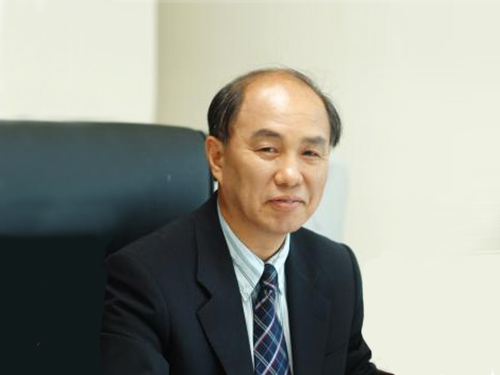 Chair Professor Jo-Won Lee Named Sixth President of National Nano Fab Center
< President Jo-Won Lee >
Chair professor Jo-Won Lee from Hanyang University was appointed as the sixth president of the National Nano Fab Center (NNFC). President Lee will serve his term for three years from September 16.
The NNFC is an affiliated institution of KAIST, established in 2002 to foster qualified manpower in the field of nanotechnology (NT) in Korea. The NNFC features cutting-edge NT-related research equipment and fabrication services, and provides students and researchers quality education and training. The NNFC seeks to become a world-leading institute by performing extensive business operations including the commercialization of NT research results and conducting various multidisciplinary projects.
President Lee received his BS degree from Hanyang University and his MS and PhD degrees in metals science from the Pennsylvania State University. He taught nano-conversion science at his alma mater, Hanyang University, while serving as the director of the National Program for Tera-level Nanodevices. President Lee also guided the governmental planning committee for the 10-year Korea Nanotechnology Initiative as secretary general.
President Lee said, “The NNFC has been striving to develop Korea as the world’s strongest nation in nanotechnology thus far. All of the members of the NNFC will continue giving our best effort for the improvement of our nation’s nanotechnology.”
(END)
2019.09.17 View 3207
Chair Professor Jo-Won Lee Named Sixth President of National Nano Fab Center
< President Jo-Won Lee >
Chair professor Jo-Won Lee from Hanyang University was appointed as the sixth president of the National Nano Fab Center (NNFC). President Lee will serve his term for three years from September 16.
The NNFC is an affiliated institution of KAIST, established in 2002 to foster qualified manpower in the field of nanotechnology (NT) in Korea. The NNFC features cutting-edge NT-related research equipment and fabrication services, and provides students and researchers quality education and training. The NNFC seeks to become a world-leading institute by performing extensive business operations including the commercialization of NT research results and conducting various multidisciplinary projects.
President Lee received his BS degree from Hanyang University and his MS and PhD degrees in metals science from the Pennsylvania State University. He taught nano-conversion science at his alma mater, Hanyang University, while serving as the director of the National Program for Tera-level Nanodevices. President Lee also guided the governmental planning committee for the 10-year Korea Nanotechnology Initiative as secretary general.
President Lee said, “The NNFC has been striving to develop Korea as the world’s strongest nation in nanotechnology thus far. All of the members of the NNFC will continue giving our best effort for the improvement of our nation’s nanotechnology.”
(END)
2019.09.17 View 3207 -
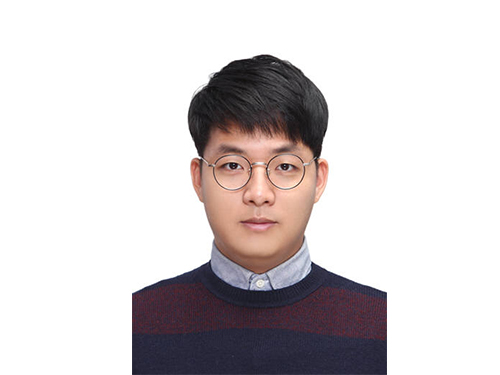 Sungjoon Park Named Google PhD Fellow
PhD candidate Sungjoon Park from the School of Computing was named a 2019 Google PhD Fellow in the field of natural language processing. The Google PhD fellowship program has recognized and supported outstanding graduate students in computer science and related fields since 2009. Park is one of three Korean students chosen as the recipients of Google Fellowships this year. A total of 54 students across the world in 12 fields were awarded this fellowship.
Park’s research on computational psychotherapy using natural language processing (NLP) powered by machine learning earned him this year’s fellowship. He presented of learning distributed representations in Korean and their interpretations during the 2017 Annual Conference of the Association for Computational Linguistics and the 2018 Conference on Empirical Methods in Natural Language Processing. He also applied machine learning-based natural language processing into computational psychotherapy so that a trained machine learning model could categorize client's verbal responses in a counseling dialogue. This was presented at the Annual Conference of the North American Chapter of the Association for Computational Linguistics.
More recently, he has been developing on neural response generation model and the prediction and extraction of complex emotion in text, and computational psychotherapy applications.
2019.09.17 View 6838
Sungjoon Park Named Google PhD Fellow
PhD candidate Sungjoon Park from the School of Computing was named a 2019 Google PhD Fellow in the field of natural language processing. The Google PhD fellowship program has recognized and supported outstanding graduate students in computer science and related fields since 2009. Park is one of three Korean students chosen as the recipients of Google Fellowships this year. A total of 54 students across the world in 12 fields were awarded this fellowship.
Park’s research on computational psychotherapy using natural language processing (NLP) powered by machine learning earned him this year’s fellowship. He presented of learning distributed representations in Korean and their interpretations during the 2017 Annual Conference of the Association for Computational Linguistics and the 2018 Conference on Empirical Methods in Natural Language Processing. He also applied machine learning-based natural language processing into computational psychotherapy so that a trained machine learning model could categorize client's verbal responses in a counseling dialogue. This was presented at the Annual Conference of the North American Chapter of the Association for Computational Linguistics.
More recently, he has been developing on neural response generation model and the prediction and extraction of complex emotion in text, and computational psychotherapy applications.
2019.09.17 View 6838 -
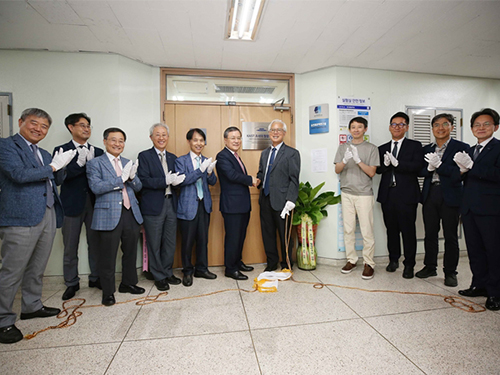 Two More Cross-generation Collaborative Labs Open
< President Sung-Chul Shin (sixth from the left) and Professor Sun Chang Kim (seventh from the left) at the signboard ceremony of KAIST BioDesigneering Laboratory >
KAIST opened two more cross-generation collaborative labs last month. KAIST BioDesigneering Laboratory headed by Professor Sun Chang Kim from the Department of Biological Sciences and Nanophotonics Laboratory led by Professor Yong-Hee Lee from the Department of Physics have been selected to receive 500 million KRW funding for five years.
A four-member selection committee including the former President of ETH Zürich Professor Emeritus Ralph Eichler and Professor Kwang-Soo Kim of Harvard Medical School conducted a three-month review and evaluation for this selection to be made. With these two new labs onboard, a total of six cross-generation collaborative labs will be operated on campus.
The operation of cross-generation collaborative labs has been in trial since March last year, as one of the KAIST’s Vision 2031 research innovation initiatives. This novel approach is to pair up senior and junior faculty members for sustaining research and academic achievements even after the senior researcher retires, so that the spectrum of knowledge and research competitiveness can be extended to future generations. The selected labs will be funded for five years, and the funding will be extended if necessary. KAIST will continue to select new labs every year.
One of this year’s selectees Professor Sun Chang Kim will be teamed up with Professor Byung-Kwan Cho from the same department and Professor Jung Kyoon Choi from the Department of Bio and Brain Engineering to collaborate in the fields of synthetic biology, systems biology, and genetic engineering. This group mainly aims at designing and synthesizing optimal genomes that can efficiently manufacture protein drug and biomedical active materials. They will also strive to secure large amounts of high-functioning natural active substances, new adhesive antibacterial peptides, and eco-friendly ecological restoration materials. It is expected that collaboration between these three multigenerational professors will help innovate their bio-convergence technology and further strengthen their international competitiveness in the global bio-market.
Another world-renowned scholar Professor Yong-Hee Lee of photonic crystal laser study will be joined by Professor Minkyo Seo from the same department and Professor Hansuek Lee from the Graduate School of Nanoscience and Technology. They will explore the extreme limits of light-material interaction based on optical micro/nano resonators, with the goal of developing future nonlinear optoelectronic and quantum optical devices. The knowledge and technology newly gained from the research are expected to provide an important platform for a diverse range of fields from quantum communications to biophysics.
(END)
2019.09.06 View 8537
Two More Cross-generation Collaborative Labs Open
< President Sung-Chul Shin (sixth from the left) and Professor Sun Chang Kim (seventh from the left) at the signboard ceremony of KAIST BioDesigneering Laboratory >
KAIST opened two more cross-generation collaborative labs last month. KAIST BioDesigneering Laboratory headed by Professor Sun Chang Kim from the Department of Biological Sciences and Nanophotonics Laboratory led by Professor Yong-Hee Lee from the Department of Physics have been selected to receive 500 million KRW funding for five years.
A four-member selection committee including the former President of ETH Zürich Professor Emeritus Ralph Eichler and Professor Kwang-Soo Kim of Harvard Medical School conducted a three-month review and evaluation for this selection to be made. With these two new labs onboard, a total of six cross-generation collaborative labs will be operated on campus.
The operation of cross-generation collaborative labs has been in trial since March last year, as one of the KAIST’s Vision 2031 research innovation initiatives. This novel approach is to pair up senior and junior faculty members for sustaining research and academic achievements even after the senior researcher retires, so that the spectrum of knowledge and research competitiveness can be extended to future generations. The selected labs will be funded for five years, and the funding will be extended if necessary. KAIST will continue to select new labs every year.
One of this year’s selectees Professor Sun Chang Kim will be teamed up with Professor Byung-Kwan Cho from the same department and Professor Jung Kyoon Choi from the Department of Bio and Brain Engineering to collaborate in the fields of synthetic biology, systems biology, and genetic engineering. This group mainly aims at designing and synthesizing optimal genomes that can efficiently manufacture protein drug and biomedical active materials. They will also strive to secure large amounts of high-functioning natural active substances, new adhesive antibacterial peptides, and eco-friendly ecological restoration materials. It is expected that collaboration between these three multigenerational professors will help innovate their bio-convergence technology and further strengthen their international competitiveness in the global bio-market.
Another world-renowned scholar Professor Yong-Hee Lee of photonic crystal laser study will be joined by Professor Minkyo Seo from the same department and Professor Hansuek Lee from the Graduate School of Nanoscience and Technology. They will explore the extreme limits of light-material interaction based on optical micro/nano resonators, with the goal of developing future nonlinear optoelectronic and quantum optical devices. The knowledge and technology newly gained from the research are expected to provide an important platform for a diverse range of fields from quantum communications to biophysics.
(END)
2019.09.06 View 8537 -
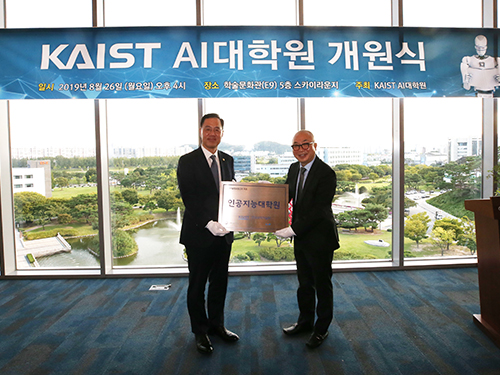 AI Graduate School to Take the Lead in Shaping the Future of AI
KAIST opened its AI Graduate School on August 26 with its first cohort of 22 Master’s and 10 PhD students for the 2019 fall semester. The new graduate school will provide students with a multidisciplinary curriculum incorporating the five key fields of healthcare, autonomous vehicles, manufacturing, security, and emerging technologies, and will offer 18 courses this semester.
KAIST was selected as one of the first three AI graduate schools that the Korean government will financially endorse to nurture top-tier AI specialists. The government will provide 9 billion KRW and KAIST will invest an additional 4.2 billion KRW in the school over the next five years.
KAIST aims to foster top-tiered AI engineers who will work for advancing emergent technologies for the Fourth Industrial Revolution. The school will produce original technologies by driving high-risk, innovative AI research projects and will be the main supplier of highly competent engineers who will lead the industry and advance the global market.
KAIST has a long history of AI research and has a top-level AI education and research infrastructure. In 1990, KAIST launched the first AI research center in Korea. Since then, KAIST has taken the lead in the field by making breakthroughs in intelligent sensing information systems and AI platforms. About 20 percent of the faculty members at KAIST, or about 120 professors, are conducting AI-related research while offering 136 AI-related courses.
The Dean of the AI Graduate School, Song Chong, said, “Our faculty members are the cream of the crop and are all in their early 40s. Although we started with only eight professors, we will employ 20 full-time professors by 2023 and will spare no effort to make the world’s best AI research hub and develop the brightest minds.”
Dean Chong said that three professors are already listed in the top ten when measured by the number of publications from the top two AI conferences, Neural Information Processing System (NIPS) and ICML (International Conference on Machine Learning). KAIST has several highly recognized faculty members who have published more than 10 NIPS/ICML papers over nine years, winning numerous awards including the ACM Sigmetrics Rising Star Award, Google AI Focused Research Award, and INFORMS Applied Probability Best Publication Award.
The number of students attempting to gain admission to the school is also very high. The admission office said that the percentage of applicants being offered admission stood at 9.1 percent. From next year, the school plans to increase the number of enrollments to 40 Master’s and 20 PhD students.
The school will also open the AI Graduate School Research Center in Songnam City next month and expand its collaboration with local companies in the Songnam and Pangyo region, both emerging techno and ICT valleys. With the placement of 60 research personnel in the center, the school plans to play a leading role in building the companies’ technical competitiveness.
The government’s keen interest was well highlighted with the attendance of many dignitaries including the Mayor of Daejeon City Tae-Jong Huh, Vice Minister of Science and ICT Won-Ki Min, and National Assemblyman Sang-Min Lee.
KAIST President Sung-Chul Shin stressed the importance of AI as a growth engine, saying, “AI will be a game changer and a key enabler of major industries. But the winner takes all in industry. Therefore, without producing the world’s top technology, we will not survive in the global market. To foster highly competitive specialists who will take the lead in this industry, we will educate students who can converge multiple disciplines and contribute to national growth and beyond in the years ahead.”
2019.08.27 View 5418
AI Graduate School to Take the Lead in Shaping the Future of AI
KAIST opened its AI Graduate School on August 26 with its first cohort of 22 Master’s and 10 PhD students for the 2019 fall semester. The new graduate school will provide students with a multidisciplinary curriculum incorporating the five key fields of healthcare, autonomous vehicles, manufacturing, security, and emerging technologies, and will offer 18 courses this semester.
KAIST was selected as one of the first three AI graduate schools that the Korean government will financially endorse to nurture top-tier AI specialists. The government will provide 9 billion KRW and KAIST will invest an additional 4.2 billion KRW in the school over the next five years.
KAIST aims to foster top-tiered AI engineers who will work for advancing emergent technologies for the Fourth Industrial Revolution. The school will produce original technologies by driving high-risk, innovative AI research projects and will be the main supplier of highly competent engineers who will lead the industry and advance the global market.
KAIST has a long history of AI research and has a top-level AI education and research infrastructure. In 1990, KAIST launched the first AI research center in Korea. Since then, KAIST has taken the lead in the field by making breakthroughs in intelligent sensing information systems and AI platforms. About 20 percent of the faculty members at KAIST, or about 120 professors, are conducting AI-related research while offering 136 AI-related courses.
The Dean of the AI Graduate School, Song Chong, said, “Our faculty members are the cream of the crop and are all in their early 40s. Although we started with only eight professors, we will employ 20 full-time professors by 2023 and will spare no effort to make the world’s best AI research hub and develop the brightest minds.”
Dean Chong said that three professors are already listed in the top ten when measured by the number of publications from the top two AI conferences, Neural Information Processing System (NIPS) and ICML (International Conference on Machine Learning). KAIST has several highly recognized faculty members who have published more than 10 NIPS/ICML papers over nine years, winning numerous awards including the ACM Sigmetrics Rising Star Award, Google AI Focused Research Award, and INFORMS Applied Probability Best Publication Award.
The number of students attempting to gain admission to the school is also very high. The admission office said that the percentage of applicants being offered admission stood at 9.1 percent. From next year, the school plans to increase the number of enrollments to 40 Master’s and 20 PhD students.
The school will also open the AI Graduate School Research Center in Songnam City next month and expand its collaboration with local companies in the Songnam and Pangyo region, both emerging techno and ICT valleys. With the placement of 60 research personnel in the center, the school plans to play a leading role in building the companies’ technical competitiveness.
The government’s keen interest was well highlighted with the attendance of many dignitaries including the Mayor of Daejeon City Tae-Jong Huh, Vice Minister of Science and ICT Won-Ki Min, and National Assemblyman Sang-Min Lee.
KAIST President Sung-Chul Shin stressed the importance of AI as a growth engine, saying, “AI will be a game changer and a key enabler of major industries. But the winner takes all in industry. Therefore, without producing the world’s top technology, we will not survive in the global market. To foster highly competitive specialists who will take the lead in this industry, we will educate students who can converge multiple disciplines and contribute to national growth and beyond in the years ahead.”
2019.08.27 View 5418 -
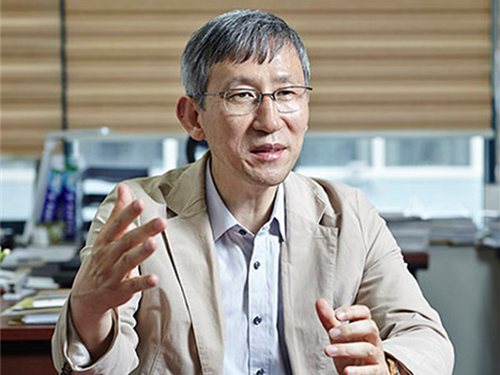 Distinguished Professor Sukbok Chang Donates His Prize Money
The honoree of the 2019 Korea Best Scientist and Technologist Award, Distinguished Professor Sukbok Chang donated his prize money of one hundred million KRW to the Chemistry Department Scholarship Fund and the Lyu Keun-Chul Sports Complex Management Fund during a donation ceremony last week.
Professor Chang won the award last month in recognition of his pioneering achievements and lifetime contributions to the development of carbon-hydrogen activation strategies, especially for carbon-carbon, carbon-nitrogen, and carbon-oxygen formations. Professor Chang, a world renowned chemist, has been recognized for his highly selective catalytic systems, allowing the controlled defunctionalization of bio-derived platform substrates under mild conditions and opening a new avenue for the utilization of biomass-derived platform chemicals.
“All my achievements are the results of my students’ hard work and dedication. I feel very fortunate to have such talented team members. I want to express my sincere gratitude for such a great research environment that we have worked together in so far,” said Professor Chang at the ceremony.
KAIST President Sung-Chul Shin said, “Not only will Professor Chang’s donation make a significant contribution to the Department of Chemistry, but also to the improvement of the Lyu Keun-Chul Sports Complex’s management, which directly links to the health and welfare of the KAIST community.”
Professor Chang currently holds the position of distinguished professor at KAIST and director of the Center for Catalytic Hydrocarbon Functionalizations in the Institute for Basic Science (IBS). He previously received the Kyung-Ahm Academic Award in 2013 and the Korea Toray Science Award in 2018. All these prize money also went to the school.
(END)
2019.08.26 View 6693
Distinguished Professor Sukbok Chang Donates His Prize Money
The honoree of the 2019 Korea Best Scientist and Technologist Award, Distinguished Professor Sukbok Chang donated his prize money of one hundred million KRW to the Chemistry Department Scholarship Fund and the Lyu Keun-Chul Sports Complex Management Fund during a donation ceremony last week.
Professor Chang won the award last month in recognition of his pioneering achievements and lifetime contributions to the development of carbon-hydrogen activation strategies, especially for carbon-carbon, carbon-nitrogen, and carbon-oxygen formations. Professor Chang, a world renowned chemist, has been recognized for his highly selective catalytic systems, allowing the controlled defunctionalization of bio-derived platform substrates under mild conditions and opening a new avenue for the utilization of biomass-derived platform chemicals.
“All my achievements are the results of my students’ hard work and dedication. I feel very fortunate to have such talented team members. I want to express my sincere gratitude for such a great research environment that we have worked together in so far,” said Professor Chang at the ceremony.
KAIST President Sung-Chul Shin said, “Not only will Professor Chang’s donation make a significant contribution to the Department of Chemistry, but also to the improvement of the Lyu Keun-Chul Sports Complex’s management, which directly links to the health and welfare of the KAIST community.”
Professor Chang currently holds the position of distinguished professor at KAIST and director of the Center for Catalytic Hydrocarbon Functionalizations in the Institute for Basic Science (IBS). He previously received the Kyung-Ahm Academic Award in 2013 and the Korea Toray Science Award in 2018. All these prize money also went to the school.
(END)
2019.08.26 View 6693 -
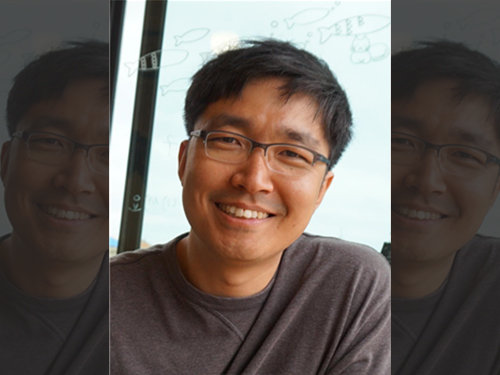 Professor Sang Gyu Kim Receives Yeochon Award for Ecology
Professor Sang-Gyu Kim from the Department of Biological Sciences was selected as the winner of the 12th Yeochon Award for Ecology presented by the Yeochon Association for Ecological Research.
The award was conferred on August 13 in Jeju at the annual conference co-hosted by the Ecological Society of Korea and the Yeochon Association for Ecological Research. Professor Kim received 10 million KRW in prize money.
Professor Kim was recognized for his achievements and contributions in studying herbivorous insects ‘rice weevils’ and their host plant ‘wild tobacco’, especially for having explored the known facts in traditional ecology at the molecular level. His findings are presented in his paper titled ‘Trichobaris weevils distinguish amongst toxic host plants by sensing volatiles that do not affect larval performance’ published in Molecular Ecology in July 2016.
Furthermore, Professor Kim’s research team is continuing their work to identify the ecological functions of plant metabolites as well as interactions between flowers and insect vectors at the molecular level. In doing so, the team edits genes in various plant species using the latest gene editing technology.
The Yeochon Award for Ecology was first established in 2005 with funds donated by a senior ecologist, the late Honorary Professor Joon-Ho Kim of Seoul National University. The award is named after the professor’s pen name “Yeochon” and is intended to encourage promising next-generation ecologists to produce outstanding research achievements in the field of basic ecology.
Professor Kim said, “I will take this award as encouragement to continue taking challenging risks to observe ecological phenomenon from a new perspective. I will continue my research with my students with joy and enthusiasm.”
2019.08.14 View 5189
Professor Sang Gyu Kim Receives Yeochon Award for Ecology
Professor Sang-Gyu Kim from the Department of Biological Sciences was selected as the winner of the 12th Yeochon Award for Ecology presented by the Yeochon Association for Ecological Research.
The award was conferred on August 13 in Jeju at the annual conference co-hosted by the Ecological Society of Korea and the Yeochon Association for Ecological Research. Professor Kim received 10 million KRW in prize money.
Professor Kim was recognized for his achievements and contributions in studying herbivorous insects ‘rice weevils’ and their host plant ‘wild tobacco’, especially for having explored the known facts in traditional ecology at the molecular level. His findings are presented in his paper titled ‘Trichobaris weevils distinguish amongst toxic host plants by sensing volatiles that do not affect larval performance’ published in Molecular Ecology in July 2016.
Furthermore, Professor Kim’s research team is continuing their work to identify the ecological functions of plant metabolites as well as interactions between flowers and insect vectors at the molecular level. In doing so, the team edits genes in various plant species using the latest gene editing technology.
The Yeochon Award for Ecology was first established in 2005 with funds donated by a senior ecologist, the late Honorary Professor Joon-Ho Kim of Seoul National University. The award is named after the professor’s pen name “Yeochon” and is intended to encourage promising next-generation ecologists to produce outstanding research achievements in the field of basic ecology.
Professor Kim said, “I will take this award as encouragement to continue taking challenging risks to observe ecological phenomenon from a new perspective. I will continue my research with my students with joy and enthusiasm.”
2019.08.14 View 5189 -
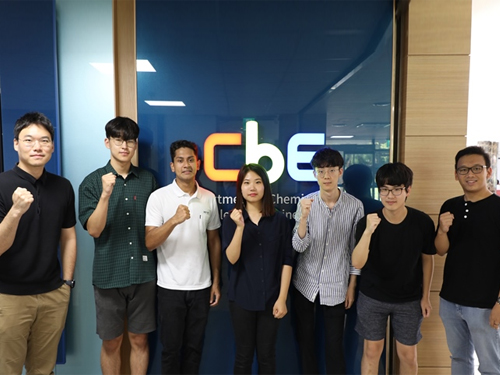 Chem-E-Car Team to Vie for World Title
Team KAItalyst, composed of KAIST undergraduate students, celebrated victory in the regional qualifying rounds of the 2019 International Chem-E-Car Competition held at KAIST’s Main Campus in Daejeon on July 20. The high finish in the national rankings qualified the team for a trip to the world finals to be held in Orlando, Florida, USA, in November.
The Chem-E-Car Competition involves designing and building a shoebox-sized model car that is powered and controlled by chemical reactions. University students from all over the world have been actively participating in this competition since the competition was introduced by the American Institute of Chemical Engineers (AIChE) in 1999.
KAIST first entered the competition in 2014, won the world finals in 2016, and then received the Most Consistent Award in 2017 and 2018. In recognition of KAIST’s consistently outstanding performance in the competition, AIChE asked KAIST to host this year’s regional competition for the first time in Korea.
Although a number of Korean university student teams have shown great interest in participating in this regional competition, most were not able to successfully implement their technology, and only two teams each from KAIST and Seoul National University (SNU) joined the competition.
Each team collaborated to fabricate a chemically powered model car that could carry a payload, and travel any distance between 15 and 30 meters. The weight of the payload and the travelling distance were randomly set an hour before the competition started, to require the participating teams adapt and perform calculations in a short period of time. The goal was to stop travelling exactly at the randomly chosen distance. The car closest to the finish line at the end of the race earned the highest amount of points. Precise control over chemical reactions was key to landing directly on the mark.
Team KAItalyst, consisting of six KAIST undergraduate students majoring in chemical and biomolecular engineering and mechanical engineering, beat their SNU rivals by stopping their car 1.5 meters closer to the goal at the end of the 22.5 meter-long race. Team KAItalyst loaded vanadium redox flow batteries onto their car to stabilize its output, and further increased the accuracy and velocity of chemical reactions through iodine clock reactions. 200 USD was awarded to Team KAItalyst, and 100 USD in prize money went to the SNU team.
KAItalyst team leader Jee-Hyun Hong said, “This was the first time for us to develop and drive our own chemically-powered model car, and we learned a lot from the challenges we faced,” Hong continued, “We will step up our efforts to perform better in the upcoming international competition.” The world finals will be held during the AIChE Fall Meeting in Orlando, Florida in November. Students from over 50 universities worldwide including the Georgia Institute of Technology and Carnegie Mellon University will compete against each other. The first, second, and third prizes at the finals will be 2,000, 1,000, and 500 USD respectively.
Professor Dong-Yeun Koh of the KAIST Chemical and Biomolecular Engineering Department who advised Team KAItalyst remarked, “I hope this year’s regional competition that KAIST held for the first time as a Korean university will be a possible starting point for more Korean universities to participate and compete in the future.”
(END)
2019.08.05 View 5485
Chem-E-Car Team to Vie for World Title
Team KAItalyst, composed of KAIST undergraduate students, celebrated victory in the regional qualifying rounds of the 2019 International Chem-E-Car Competition held at KAIST’s Main Campus in Daejeon on July 20. The high finish in the national rankings qualified the team for a trip to the world finals to be held in Orlando, Florida, USA, in November.
The Chem-E-Car Competition involves designing and building a shoebox-sized model car that is powered and controlled by chemical reactions. University students from all over the world have been actively participating in this competition since the competition was introduced by the American Institute of Chemical Engineers (AIChE) in 1999.
KAIST first entered the competition in 2014, won the world finals in 2016, and then received the Most Consistent Award in 2017 and 2018. In recognition of KAIST’s consistently outstanding performance in the competition, AIChE asked KAIST to host this year’s regional competition for the first time in Korea.
Although a number of Korean university student teams have shown great interest in participating in this regional competition, most were not able to successfully implement their technology, and only two teams each from KAIST and Seoul National University (SNU) joined the competition.
Each team collaborated to fabricate a chemically powered model car that could carry a payload, and travel any distance between 15 and 30 meters. The weight of the payload and the travelling distance were randomly set an hour before the competition started, to require the participating teams adapt and perform calculations in a short period of time. The goal was to stop travelling exactly at the randomly chosen distance. The car closest to the finish line at the end of the race earned the highest amount of points. Precise control over chemical reactions was key to landing directly on the mark.
Team KAItalyst, consisting of six KAIST undergraduate students majoring in chemical and biomolecular engineering and mechanical engineering, beat their SNU rivals by stopping their car 1.5 meters closer to the goal at the end of the 22.5 meter-long race. Team KAItalyst loaded vanadium redox flow batteries onto their car to stabilize its output, and further increased the accuracy and velocity of chemical reactions through iodine clock reactions. 200 USD was awarded to Team KAItalyst, and 100 USD in prize money went to the SNU team.
KAItalyst team leader Jee-Hyun Hong said, “This was the first time for us to develop and drive our own chemically-powered model car, and we learned a lot from the challenges we faced,” Hong continued, “We will step up our efforts to perform better in the upcoming international competition.” The world finals will be held during the AIChE Fall Meeting in Orlando, Florida in November. Students from over 50 universities worldwide including the Georgia Institute of Technology and Carnegie Mellon University will compete against each other. The first, second, and third prizes at the finals will be 2,000, 1,000, and 500 USD respectively.
Professor Dong-Yeun Koh of the KAIST Chemical and Biomolecular Engineering Department who advised Team KAItalyst remarked, “I hope this year’s regional competition that KAIST held for the first time as a Korean university will be a possible starting point for more Korean universities to participate and compete in the future.”
(END)
2019.08.05 View 5485 -
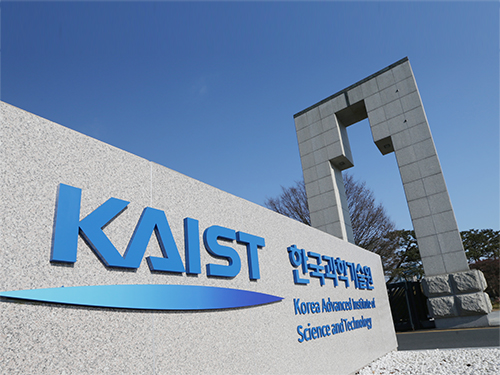 KAMP to Help SMEs Achieve Technological Independence
As the Japanese government dropped Korea from its ‘White List’ of favored trade partner status last week, KAIST launched an advisory group to help the SMEs that are expected to be the most affected by the decision.
President Sung-Chul Shin announced on August 5 that KAIST is launching KAIST Advisors on Materials and Parts (KAMP), which is composed of 100 faculty members from five fields. President Shin said that KAIST would like to use this national crisis as an opportunity to make another leap forward by taking very timely and appropriate actions to help Korean SMEs achieve technological independence.
Headed by the Vice Dean of the College of Engineering, Sung-Yool Choi, KAMP will mainly advise in the fields of materials, parts, and equipment, which are crucial components for Korea’s key industries of semiconductors, energy, and automobiles. President Shin made the announcement following a meeting with senior leadership over the weekend. Faculty members including honorary professors from each committee’s department will be included as advisory group members.
In the letter sent out to the entire faculty right after the meeting, President Shin stressed the roles and responsibilities of scientists and engineers, especially from KAIST, which was founded with the national mission to foster the scientists and engineers urgently needed to work for the nation’s industrialization and R&D. He also said, “We now take on our new calling to deal with technology hegemony in the midst of this crisis caused by the worsening tensions between the two countries.” He added, “Soldiers were the main force in the frontline protecting the country during the period in which the military ruled. However, in this era where technology reigns, especially in the face of the Fourth Industrial Revolution, scientists and engineers should come forward to the frontlines.”
KAMP will be composed of the following five technology committees:
- The Advanced Materials Committee led by the Head of the Department of Materials Science and Engineering
- The Chemistry and Biology Committee led by the Head of the Department of Chemistry
- The Chemical Engineering and Equipment Committee led by the Head of the Department of Chemical and Biomolecular Engineering
- The Electronics and Computer Committee led by the Head of the School of Electrical Engineering - The Machinery and Aerospace Committee led by the Head of Department of the Mechanical Engineering
KAMP will support the development of 159 key technologies out of the 1,194 on the affected list. To promptly respond to the SMEs’ technological challenges, KAMP will designate an exclusive advisor based on the technological challenges they are experiencing.
Serving as emergency tech service providers, KAMP will identify and analyze the problems and will systematically manage the problem-solving procedures. In close collaboration with the Office of University-Industry Cooperation, KAMP will drive the innovative growth of Korea and will help it become highly technologically competitive and independent in the fields of key materials, parts, and equipment. President Shin said the university will make every effort institutionally and financially to make this advisory group’s work successful.
For SMEs who wish to use the KAMP advisory service, call +82-(0)42-350-6119 or send an email to smbrnd@kaist.ac.kr.
(END)
2019.08.05 View 3502
KAMP to Help SMEs Achieve Technological Independence
As the Japanese government dropped Korea from its ‘White List’ of favored trade partner status last week, KAIST launched an advisory group to help the SMEs that are expected to be the most affected by the decision.
President Sung-Chul Shin announced on August 5 that KAIST is launching KAIST Advisors on Materials and Parts (KAMP), which is composed of 100 faculty members from five fields. President Shin said that KAIST would like to use this national crisis as an opportunity to make another leap forward by taking very timely and appropriate actions to help Korean SMEs achieve technological independence.
Headed by the Vice Dean of the College of Engineering, Sung-Yool Choi, KAMP will mainly advise in the fields of materials, parts, and equipment, which are crucial components for Korea’s key industries of semiconductors, energy, and automobiles. President Shin made the announcement following a meeting with senior leadership over the weekend. Faculty members including honorary professors from each committee’s department will be included as advisory group members.
In the letter sent out to the entire faculty right after the meeting, President Shin stressed the roles and responsibilities of scientists and engineers, especially from KAIST, which was founded with the national mission to foster the scientists and engineers urgently needed to work for the nation’s industrialization and R&D. He also said, “We now take on our new calling to deal with technology hegemony in the midst of this crisis caused by the worsening tensions between the two countries.” He added, “Soldiers were the main force in the frontline protecting the country during the period in which the military ruled. However, in this era where technology reigns, especially in the face of the Fourth Industrial Revolution, scientists and engineers should come forward to the frontlines.”
KAMP will be composed of the following five technology committees:
- The Advanced Materials Committee led by the Head of the Department of Materials Science and Engineering
- The Chemistry and Biology Committee led by the Head of the Department of Chemistry
- The Chemical Engineering and Equipment Committee led by the Head of the Department of Chemical and Biomolecular Engineering
- The Electronics and Computer Committee led by the Head of the School of Electrical Engineering - The Machinery and Aerospace Committee led by the Head of Department of the Mechanical Engineering
KAMP will support the development of 159 key technologies out of the 1,194 on the affected list. To promptly respond to the SMEs’ technological challenges, KAMP will designate an exclusive advisor based on the technological challenges they are experiencing.
Serving as emergency tech service providers, KAMP will identify and analyze the problems and will systematically manage the problem-solving procedures. In close collaboration with the Office of University-Industry Cooperation, KAMP will drive the innovative growth of Korea and will help it become highly technologically competitive and independent in the fields of key materials, parts, and equipment. President Shin said the university will make every effort institutionally and financially to make this advisory group’s work successful.
For SMEs who wish to use the KAMP advisory service, call +82-(0)42-350-6119 or send an email to smbrnd@kaist.ac.kr.
(END)
2019.08.05 View 3502 -
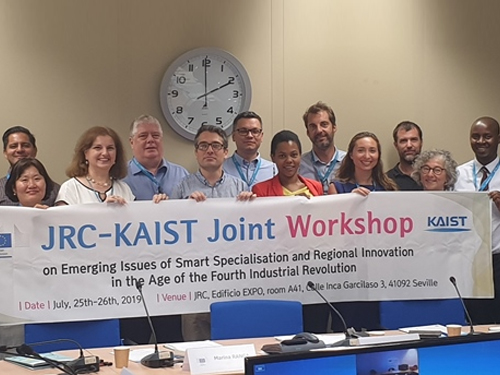 FIRIC-EU JRC Joint Workshop on Smart Specialization
The Fourth Industrial Revolution Intelligence Center (FIRIC) at KAIST discussed ‘Smart Specialization’ for regional innovation and economic growth in the wake of the Fourth Industrial Revolution during the workshop with the EU Joint Research Center (EU-JRC) in Seville, Spain last week. The two sides also agreed to sign an MOU to expand mutual collaboration.
KAIST’s FIRIC was founded in cooperation with the World Economic Forum in July 2017 to carry out policy research for the promotion of science and technology-based inclusive growth and innovation and to lead related global efforts. The EU-JRC has committed to developing cohesive policies that aim to narrow regional gaps within the European Union. Founded in 1958 in Brussels, the EU-JRC has long been in charge of EU strategies for regional innovation based on emerging technologies.
The workshop also covered issues related to public-private partnerships and innovation clusters from the perspective of the EU and Asia, such as the global value chain and the implementation of industrial clusters policy amid the changes in the industrial ecosystem due to digitalization, automation, and the utilization of robotics during the Fourth Industrial Revolution.
In addition, the session included discussions on inclusive growth and job market changes in the era of the Fourth Industrial Revolution, addressing how Smart Specialization and the outcomes of the 4IR will shift the paradigm of current job and technology capabilities, as well as employment issues in many relevant industries. In particular, the actual case studies and their related policies and regulatory trends regarding the potential risks and ethical issues of artificial intelligence were introduced.
Regarding the financial services that utilize blockchain technologies and the establishment of public sector governance for such technologies, the participating experts noted difficulties in the diffusion of blockchain-based local currencies or public services, which call for a sophisticated analytical and practical framework for innovative and transparent governance.
Dr. Mark Boden, the Team Leader of the EU-JRC, introduced the EU’s initiatives to promote Smart Specialization, such as its policy process, governance design, vision sharing, and priority setting, with particular emphasis on targeted support for Smart Specialization in lagging regions. Professor So Young Kim, who is the dean of the Graduate School of Science and Technology Policy and FIRIC’s Deputy Director said, “KAIST’s global role regarding the Fourth Industrial Revolution will be expanded in the process of exploring and developing innovative models of technology-policy governance while working jointly with the EU-JRC.”
2019.08.02 View 6374
FIRIC-EU JRC Joint Workshop on Smart Specialization
The Fourth Industrial Revolution Intelligence Center (FIRIC) at KAIST discussed ‘Smart Specialization’ for regional innovation and economic growth in the wake of the Fourth Industrial Revolution during the workshop with the EU Joint Research Center (EU-JRC) in Seville, Spain last week. The two sides also agreed to sign an MOU to expand mutual collaboration.
KAIST’s FIRIC was founded in cooperation with the World Economic Forum in July 2017 to carry out policy research for the promotion of science and technology-based inclusive growth and innovation and to lead related global efforts. The EU-JRC has committed to developing cohesive policies that aim to narrow regional gaps within the European Union. Founded in 1958 in Brussels, the EU-JRC has long been in charge of EU strategies for regional innovation based on emerging technologies.
The workshop also covered issues related to public-private partnerships and innovation clusters from the perspective of the EU and Asia, such as the global value chain and the implementation of industrial clusters policy amid the changes in the industrial ecosystem due to digitalization, automation, and the utilization of robotics during the Fourth Industrial Revolution.
In addition, the session included discussions on inclusive growth and job market changes in the era of the Fourth Industrial Revolution, addressing how Smart Specialization and the outcomes of the 4IR will shift the paradigm of current job and technology capabilities, as well as employment issues in many relevant industries. In particular, the actual case studies and their related policies and regulatory trends regarding the potential risks and ethical issues of artificial intelligence were introduced.
Regarding the financial services that utilize blockchain technologies and the establishment of public sector governance for such technologies, the participating experts noted difficulties in the diffusion of blockchain-based local currencies or public services, which call for a sophisticated analytical and practical framework for innovative and transparent governance.
Dr. Mark Boden, the Team Leader of the EU-JRC, introduced the EU’s initiatives to promote Smart Specialization, such as its policy process, governance design, vision sharing, and priority setting, with particular emphasis on targeted support for Smart Specialization in lagging regions. Professor So Young Kim, who is the dean of the Graduate School of Science and Technology Policy and FIRIC’s Deputy Director said, “KAIST’s global role regarding the Fourth Industrial Revolution will be expanded in the process of exploring and developing innovative models of technology-policy governance while working jointly with the EU-JRC.”
2019.08.02 View 6374 -
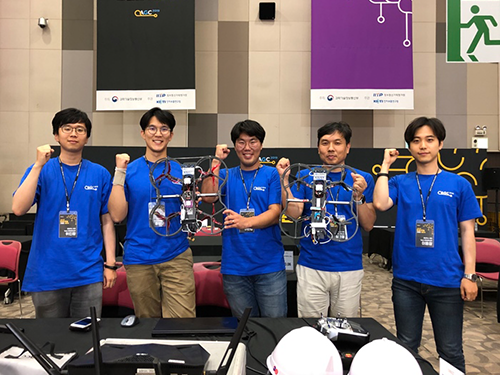 'Flying Drones for Rescue'
(Video Credit: ⓒNASA JPL)
< Team USRG and Professor Shim (second from the right) >
Having recently won the AI R&D Grand Challenge Competition in Korea, Team USRG (Unmanned System Research Group) led by Professor Hyunchul Shim from the School of Electrical Engineering is all geared up to take on their next challenges: the ‘Defense Advanced Research Projects Agency Subterranean Challenge (DARPA SubT Challenge)’ and ‘Lockheed Martin’s AlphaPilot Challenge’ next month.
Team USRG won the obstacle course race in the ‘2019 AI R&D Grand Challenge Competition’ on July 12. They managed to successfully dominate the challenging category of ‘control intelligence.’ Having to complete the obstacle course race solely using AI systems without any connection to the internet made it difficult for most of the eight participating teams to pass the third section of the race, and only Team USRG passed the long pipeline course during their attempt in the main event. They also demonstrated, after the main event, that their drone can navigate all of the checkpoints including landing on the “H” mark using deep learning.
Their drone flew through polls and pipes, and escaped from windows and mazes against strong winds, amid cheers and groans from the crowd gathered at the Korea Exhibition Center (KINTEX) in Goyang, Korea. The team was awarded three million KRW in prize money, and received a research grant worth six hundred million KRW from the Ministry of Science and ICT (MSIT).
“Being ranked first in the race for which we were never given a chance for a test flight means a lot to our team. Considering that we had no information on the exact size of the course in advance, this is a startling result,” said Professor Shim. “We will carry out further research with this funding, and compete once again with the improved AI and drone technology in the 2020 competition,” he added.
The AI R&D Grand Challenge Competition, which was first started in 2017, has been designed to promote AI research and development and expand its application to addressing high-risk technical challenges with significant socio-economic impact.
This year’s competition presented participants with a task where they had to develop AI software technology for drones to navigate themselves autonomously during complex disaster relief operations such as aid delivery.
Each team participated in one of the four tracks of the competition, and their drones were evaluated based on the criteria for each track. The divisions were broken up into intelligent context-awareness, intelligent character recognition, auditory intelligence, and control intelligence.
Team USRG’s technological prowess has been already well acclaimed among international peer groups. Teamed up with NASA JPL, Caltech, and MIT, they will compete in the subterranean mission during the ‘DARPA SubT Challenge’.
Team CoSTAR, as its name stands for, is working together to build ‘Collaborative SubTerranean Autonomous Resilient Robots.’ Professor Shim emphasized the role KAIST plays in Team CoSTAR as a leader in drone technology.
“I think when our drone technology will be added to our peers’ AI and robotics, Team CoSTAR will bring out unsurpassable synergy in completing the subterrestrial and planetary applications. I would like to follow the footprint of Hubo, the winning champion of the 2015 DARPA Robotics Challenge and even extend it to subterranean exploration,” he said.
These next generation autonomous subsurface explorers are now all optimizing the physical AI robot systems developed by Team CoSTAR. They will test their systems in more realistic field environments August 15 through 22 in Pittsburgh, USA. They have already received funding from DARPA for participating.
Team CoSTAR will compete in three consecutive yearly events starting this year, and the last event, planned for 2021, will put the team to the final test with courses that incorporate diverse challenges from all three events. Two million USD will be awarded to the winner after the final event, with additional prizes of up to 200,000 USD for self-funded teams.
Team USRG also ranked third in the recent Hyundai Motor Company’s ‘Autonomous Vehicle Competition’ and another challenge is on the horizon: Lockheed Martin’s ‘AlphaPilot Challenge’. In this event, the teams will be flying their drones through a series of racing gates, trying to beat the best human pilot. The challenge is hosted by Lockheed Martin, the world’s largest military contractor and the maker of the famed F-22 and F-35 stealth fighters, with the goal of stimulating the development of autonomous drones. Team USRG was selected from out of more than 400 teams from around the world and is preparing for a series of races this fall, beginning from the end of August.
Professor Shim said, “It is not easy to perform in a series of competitions in just a few months, but my students are smart, hardworking, and highly motivated. These events indeed demand a lot, but they really challenge the researchers to come up with technologies that work in the real world. This is the way robotics really should be.”
(END)
2019.07.26 View 9854
'Flying Drones for Rescue'
(Video Credit: ⓒNASA JPL)
< Team USRG and Professor Shim (second from the right) >
Having recently won the AI R&D Grand Challenge Competition in Korea, Team USRG (Unmanned System Research Group) led by Professor Hyunchul Shim from the School of Electrical Engineering is all geared up to take on their next challenges: the ‘Defense Advanced Research Projects Agency Subterranean Challenge (DARPA SubT Challenge)’ and ‘Lockheed Martin’s AlphaPilot Challenge’ next month.
Team USRG won the obstacle course race in the ‘2019 AI R&D Grand Challenge Competition’ on July 12. They managed to successfully dominate the challenging category of ‘control intelligence.’ Having to complete the obstacle course race solely using AI systems without any connection to the internet made it difficult for most of the eight participating teams to pass the third section of the race, and only Team USRG passed the long pipeline course during their attempt in the main event. They also demonstrated, after the main event, that their drone can navigate all of the checkpoints including landing on the “H” mark using deep learning.
Their drone flew through polls and pipes, and escaped from windows and mazes against strong winds, amid cheers and groans from the crowd gathered at the Korea Exhibition Center (KINTEX) in Goyang, Korea. The team was awarded three million KRW in prize money, and received a research grant worth six hundred million KRW from the Ministry of Science and ICT (MSIT).
“Being ranked first in the race for which we were never given a chance for a test flight means a lot to our team. Considering that we had no information on the exact size of the course in advance, this is a startling result,” said Professor Shim. “We will carry out further research with this funding, and compete once again with the improved AI and drone technology in the 2020 competition,” he added.
The AI R&D Grand Challenge Competition, which was first started in 2017, has been designed to promote AI research and development and expand its application to addressing high-risk technical challenges with significant socio-economic impact.
This year’s competition presented participants with a task where they had to develop AI software technology for drones to navigate themselves autonomously during complex disaster relief operations such as aid delivery.
Each team participated in one of the four tracks of the competition, and their drones were evaluated based on the criteria for each track. The divisions were broken up into intelligent context-awareness, intelligent character recognition, auditory intelligence, and control intelligence.
Team USRG’s technological prowess has been already well acclaimed among international peer groups. Teamed up with NASA JPL, Caltech, and MIT, they will compete in the subterranean mission during the ‘DARPA SubT Challenge’.
Team CoSTAR, as its name stands for, is working together to build ‘Collaborative SubTerranean Autonomous Resilient Robots.’ Professor Shim emphasized the role KAIST plays in Team CoSTAR as a leader in drone technology.
“I think when our drone technology will be added to our peers’ AI and robotics, Team CoSTAR will bring out unsurpassable synergy in completing the subterrestrial and planetary applications. I would like to follow the footprint of Hubo, the winning champion of the 2015 DARPA Robotics Challenge and even extend it to subterranean exploration,” he said.
These next generation autonomous subsurface explorers are now all optimizing the physical AI robot systems developed by Team CoSTAR. They will test their systems in more realistic field environments August 15 through 22 in Pittsburgh, USA. They have already received funding from DARPA for participating.
Team CoSTAR will compete in three consecutive yearly events starting this year, and the last event, planned for 2021, will put the team to the final test with courses that incorporate diverse challenges from all three events. Two million USD will be awarded to the winner after the final event, with additional prizes of up to 200,000 USD for self-funded teams.
Team USRG also ranked third in the recent Hyundai Motor Company’s ‘Autonomous Vehicle Competition’ and another challenge is on the horizon: Lockheed Martin’s ‘AlphaPilot Challenge’. In this event, the teams will be flying their drones through a series of racing gates, trying to beat the best human pilot. The challenge is hosted by Lockheed Martin, the world’s largest military contractor and the maker of the famed F-22 and F-35 stealth fighters, with the goal of stimulating the development of autonomous drones. Team USRG was selected from out of more than 400 teams from around the world and is preparing for a series of races this fall, beginning from the end of August.
Professor Shim said, “It is not easy to perform in a series of competitions in just a few months, but my students are smart, hardworking, and highly motivated. These events indeed demand a lot, but they really challenge the researchers to come up with technologies that work in the real world. This is the way robotics really should be.”
(END)
2019.07.26 View 9854 -
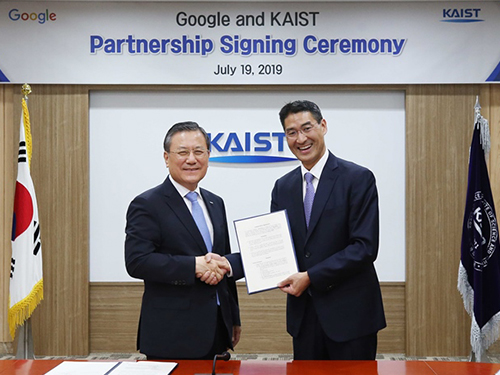 KAIST-Google Partnership for AI Education and Research
Google has agreed to support KAIST students and professors in the fields of AI research and education. President Sung-Chul Shin and Google Korea Country Director John Lee signed the collaboration agreement during a ceremony on July 19 at KAIST.
Under the agreement, Google will fund the Google AI-Focused Research Awards Program, the PhD Fellowship Program, and Student Travel Grants for KAIST. In addition, Google will continue to provide more academic and career building opportunities for students, including Google internship programs.
KAIST and Google has been collaborating for years. Professor Steven Whang at the School of Electrical Engineering and Professor Sung Ju Hwang at the School of Computing won the AI-Focused Award in 2018 and conduct their researches on "Improving Generalization and Reliability of Any Deep Neural Networks" and "Automatic and Acitionable Model Analysis for TFX," respectively. Outstanding PhD students have been recognized through the PhD Fellowship Program. However, this new collaboration agreement will focus on research, academic development, and technological innovation in AI.
Google plans to support research in the fields of deep learning, cloud machine learning, and voice technologies. Google will fund the development of two educational programs based on Google open source technology each year for two years that will be used in the new AI Graduate School opening for the fall semester.
John Lee of Google Korea said, “This partnership lays a solid foundation for deeper collaboration.” President Shin added, “This partnership will not only advance Korea’s global competitiveness in AI-powered industries but also contribute to the global community by nurturing talents in this most extensive discipline.”
2019.07.22 View 6707
KAIST-Google Partnership for AI Education and Research
Google has agreed to support KAIST students and professors in the fields of AI research and education. President Sung-Chul Shin and Google Korea Country Director John Lee signed the collaboration agreement during a ceremony on July 19 at KAIST.
Under the agreement, Google will fund the Google AI-Focused Research Awards Program, the PhD Fellowship Program, and Student Travel Grants for KAIST. In addition, Google will continue to provide more academic and career building opportunities for students, including Google internship programs.
KAIST and Google has been collaborating for years. Professor Steven Whang at the School of Electrical Engineering and Professor Sung Ju Hwang at the School of Computing won the AI-Focused Award in 2018 and conduct their researches on "Improving Generalization and Reliability of Any Deep Neural Networks" and "Automatic and Acitionable Model Analysis for TFX," respectively. Outstanding PhD students have been recognized through the PhD Fellowship Program. However, this new collaboration agreement will focus on research, academic development, and technological innovation in AI.
Google plans to support research in the fields of deep learning, cloud machine learning, and voice technologies. Google will fund the development of two educational programs based on Google open source technology each year for two years that will be used in the new AI Graduate School opening for the fall semester.
John Lee of Google Korea said, “This partnership lays a solid foundation for deeper collaboration.” President Shin added, “This partnership will not only advance Korea’s global competitiveness in AI-powered industries but also contribute to the global community by nurturing talents in this most extensive discipline.”
2019.07.22 View 6707 -
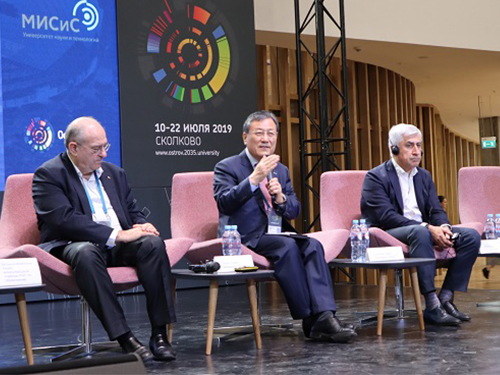 President Shin Shares Innovation Strategy at Moscow
President Sung-Chul Shin shared the recipe for success for rapid national development through university education during the Island 10-22 Conference held at the Skolov Institute of Science and Technology in Moscow on July 16.
President Shin stressed how urgent it is for higher education to rapidly embrace the new global economic environment brought about by the Fourth Industrial Revolution in his keynote address entitled ‘Roles and Responsibilities of Universities for Rapid National Development’.
The Island 10-22 Conference is a summit co-organized by the National University of Science and Technology MISIS and University of the National Technological Initiative 2035 and supported by the Ministry of Science and Higher Education of the Russian Federation. More than 30 world-renowned experts, presidents of leading technological universities including President Peretz Lavie from the Israel Institute of Technology Technion, President Scott Pulsipher from Western Governors University and specialists in big data participated in the conference as speakers and discussed a diverse spectrum of ideas for making innovations and digital transformations in universities. More than 1,600 participants joined the conference.
During his keynote speech, President Shin explained how Korea has achieved such rapid economic growth over the past half century. He cited the Korean government’s vision and innovation policies as factors leading to Korea’s phenomenal success. KAIST, one of the results of the Korean government’s innovation policy, led the nation to advanced technological breakthroughs in industries such as semiconductors. Such visionary policies and investments in science, technology, and education eventually made the Korea of today possible.
President Shin said that KAIST distinguished itself through its new vision of C3 that fosters intellectual creativity, caring for others, and a challenging mind . Under Vision 2031, a blueprint for becoming a leading global university, President Shin said the KAIST continues to strive for innovations in convergent education,research and entreprenurship.
2019.07.18 View 5218
President Shin Shares Innovation Strategy at Moscow
President Sung-Chul Shin shared the recipe for success for rapid national development through university education during the Island 10-22 Conference held at the Skolov Institute of Science and Technology in Moscow on July 16.
President Shin stressed how urgent it is for higher education to rapidly embrace the new global economic environment brought about by the Fourth Industrial Revolution in his keynote address entitled ‘Roles and Responsibilities of Universities for Rapid National Development’.
The Island 10-22 Conference is a summit co-organized by the National University of Science and Technology MISIS and University of the National Technological Initiative 2035 and supported by the Ministry of Science and Higher Education of the Russian Federation. More than 30 world-renowned experts, presidents of leading technological universities including President Peretz Lavie from the Israel Institute of Technology Technion, President Scott Pulsipher from Western Governors University and specialists in big data participated in the conference as speakers and discussed a diverse spectrum of ideas for making innovations and digital transformations in universities. More than 1,600 participants joined the conference.
During his keynote speech, President Shin explained how Korea has achieved such rapid economic growth over the past half century. He cited the Korean government’s vision and innovation policies as factors leading to Korea’s phenomenal success. KAIST, one of the results of the Korean government’s innovation policy, led the nation to advanced technological breakthroughs in industries such as semiconductors. Such visionary policies and investments in science, technology, and education eventually made the Korea of today possible.
President Shin said that KAIST distinguished itself through its new vision of C3 that fosters intellectual creativity, caring for others, and a challenging mind . Under Vision 2031, a blueprint for becoming a leading global university, President Shin said the KAIST continues to strive for innovations in convergent education,research and entreprenurship.
2019.07.18 View 5218